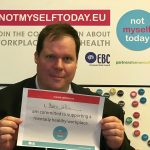With soaring energy costs adding to the cost-of-living crisis, Belgian workers now face another pressing issue: the collapse of the childcare sector.

COVID-19 is taking a toll on the mental health of people. The road to recovery risks worsening the stress epidemic Europe has been in for years.

For the past fifteen years, the ever-growing presence of technology has changed our lives, our habits, and our working structures.

Mental health in the workplace is the theme of the World Mental Health Day 2017, observed on 10 October. To focus on the workplace is key to combat the global rise of mental health disorders – many of which are caused by stress.

Costs of psychosocial health risks due to work is estimated at 617 billion euros per year. Prevention policies can bring huge benefits.

Le coût des risques psychosociaux dues au travail à 617 milliards d’euros par an. C´est exorbitante au regard des bénéfices des politiques de prévention.

Employers should put employees´ mental health at the very top of the agenda especially at this time of ongoing and continuous changes in the labor market that are affecting a key dimension of job quality – health and safety – and which are contributing to the increase of psychosocial risks at a great extent.

Psychosocial health risks and mental health is a big challenge. The European Commission must change the main directive on occupational health and safety.

The social partners need to take on the issue of mental health at work. Mental disorders are very common in Europe and are a major burden on society. There is also a need to clarify in legislation that occupational health and safety at work is not only about the physical workplace.

Many efforts are put in sensitising employers and employees to adhere the necessary attention to psychosocial risks.

“Too many professionals burn out in the first 10 years of their career so it’s time to make expectations more realistic and stop this terrible waste of talent,” declared Ulf Bengtsson.

